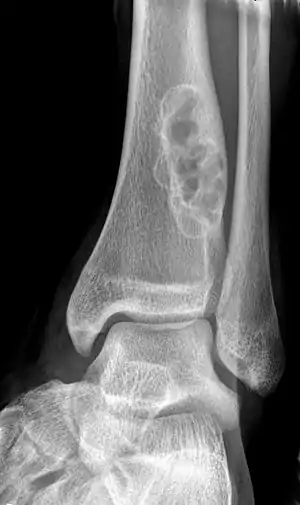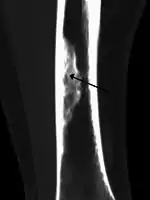Nonossifying fibroma
A nonossifying fibroma is a common benign bone tumor in children and adolescents.[1] However, it is controversial whether it represents a true neoplasm or rather a developmental disorder of growing bone. Radiographically, the tumor presents as a well marginated radiolucent lesion, with a distinct multilocular appearance. These foci consist of collagen rich connective tissue, fibroblasts, histiocytes and osteoclasts. They originate from the growth plate, and are located in adjacent parts of the metaphysis and diaphysis of long bones, most often of the legs. No treatment is needed in asymptomatic patients and spontaneous remission with replacement by bone tissue is to be expected.
| Nonossifying fibroma | |
|---|---|
| Other names | Fibroxanthoma |
 | |
| X-ray of nonossifying fibroma of distal tibia. | |
| Specialty | Rheumatology |
Multiple nonossifying fibromas occur in Jaffe-Campanacci syndrome in combination with cafe-au-lait spots, mental retardation, hypogonadism, ocular and cardiovascular abnormalities.
The oldest case of nonossifying fibroma has been identified on the mandible of Qafzeh 9, an early anatomically modern human dated to 90–100 000 yrs B.P.[2]
Additional images

See also
References
- Bowers, Leah M.; Cohen, Donald M.; Bhattacharyya, Indraneel; Pettigrew, James C.; Stavropoulos, Mary F. (25 September 2012). "The Non-ossifying Fibroma: A Case Report and Review of the Literature". Head and Neck Pathology. 7 (2): 203–210. doi:10.1007/s12105-012-0399-7. ISSN 1936-055X. PMC 3642261. PMID 23008139.
- Coutinho Nogueira D, Dutour O, Coqueugniot H, Tillier A.-m., (2019) Qafzeh 9 mandible (ca 90–100 kyrs BP, Israel) revisited : μ-CT and 3D reveal new pathological conditions, International Journal of Paleopathology, Vol 26, pp.104-110, https://doi.org/10.1016/j.ijpp.2019.06.002
External links
 Media related to Nonossifying fibroma at Wikimedia Commons
Media related to Nonossifying fibroma at Wikimedia Commons- Wheeless' Textbook of Orthopaedics: Nonossifying Fibroma
| Classification | |
|---|---|
| External resources |